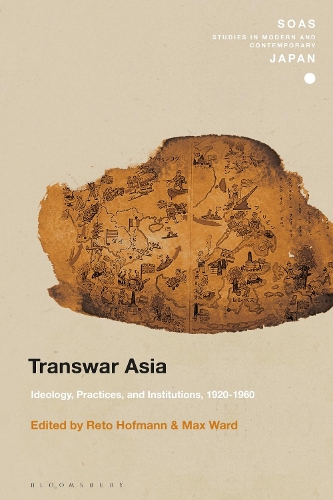
Transwar Asia: Ideology, Practices, and Institutions, 1920-1960
(Hardback)
Available Formats
Publishing Details
Transwar Asia: Ideology, Practices, and Institutions, 1920-1960
By (Author) Dr Reto Hofmann
Edited by Associate Professor Max Ward
Bloomsbury Publishing PLC
Bloomsbury Academic
13th January 2022
United Kingdom
Classifications
Tertiary Education
Non Fiction
Modern warfare
950.41
Physical Properties
Hardback
240
Width 156mm, Height 234mm
513g
Description
This volume considers the possibilities of the term transwar to understand the history of Asia from the 1920s to the 1960s. Recently, scholars have challenged earlier studies that suggested a neat division between the pre- and postwar or colonial/postcolonial periods in the national histories of East Asia, instead assessing change and continuity across the divide of war. Taking this reconsideration further, Transwar Asia explores the complex processes by which prewar and colonial ideologies, practices, and institutions from the 1920s and 1930s were reconfigured during World War II and, crucially, in the two decades that followed, thus shaping the Asian Cold War and the processes of decolonization and nation state-formation. With contributions covering the transwar histories of China, Indonesia, Korea, Japan, the Philippines and Taiwan, the book addresses key themes such as authoritarianism, militarization, criminal rehabilitation, market controls, labor-regimes, and anti-communism. A transwar angle, the authors argue, sheds new light on the continuing problems that undergirded the formation of postwar nation-states and illuminates the political legacies that still shape the various regions in Asia up to the present.
Reviews
Pursuing a transwar perspective, both as analytic method and alternative history, these essays cross the alleged rupture of 1945 to show the connections across time from the 1920s to the 1960s and across space in the entangled nations and empires in Asia and beyond. Their fascinating topics and compelling arguments bring new depth to the term "transwar". * Carol Gluck, George Sansom Professor of History, Columbia University, USA *
This volume injects us with an effective dose of reformulation, recalibration and resetting in our understanding of twentieth-century global Asia. The spaciotemporality of transwar Asia as method provides a long dure perspective on knowledge-, practice- and institution-formation within competing imperialisms. It is a welcome and timely volume that all students of modern global history would benefit from reading. * Sho Konishi, Director of the Nissan Institute of Japanese Studies; Associate Professor in Modern Japanese History, University of Oxford, UK *
Author Bio
Reto Hofmann is Senior Lecturer in Asian Studies at the University of Western Australia. He is author of The Fascist Effect: Japan and Italy, 1915-1952 (2015) and is currently writing a transwar history of Japanese conservatism. Max Ward is Associate Professor of Japanese History at Middlebury College, USA. He is the author of Thought Crime: Ideology and State Power in Interwar Japan (2019) and co-editor of Confronting Capital and Empire: Rethinking Kyoto School Philosophy (2017).
